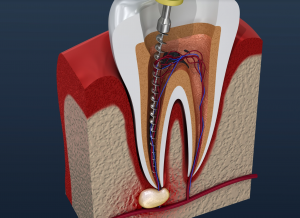
Root canals are common and necessary treatments to relieve the pain within your infected tooth and to clear out the infection before it becomes worse. With the advancements of modern dentistry, most patients say that they remain comfortable throughout the duration of the treatment.
What is a root canal?
Root canals are treatments to treat infections on the inside of a tooth. Normally, root canals take one or two visits to complete. During a root canal, your dentist will examine the extent of the infection using an X-ray. Your tooth will be numbed using local anesthetic so that you can remain comfortable throughout the procedure. The dentist will create an opening at the top of your tooth to allow small instruments to clear the infected tooth pulp from inside your tooth. It is crucial to remove this infected material completely from your pulp chamber and root canals. Next, the dentist fills the empty space within the root canals to seal them and protect them from further infection. At this point, you may receive a temporary filling or crown before returning to get a permanent crown in a subsequent visit.
After your root canal, your dentist will give you instructions on how to care for your tooth. It is important to follow them carefully to avoid causing yourself pain, damaging your tooth, or affecting the filling or crown you just received. You may experience sensitivity or mild discomfort. Your dentist may advise you to use over the counter pain medication to remain comfortable throughout your recovery.
Root canals are the best way to treat an infected tooth with the goal of saving a tooth. In the end, extractions for the infected tooth may be more expensive than a root canal because of the additional replacement procedures that may be necessary to pursue.
Who might need a root canal?
Root canals are necessary to treat inflamed and infected soft tissue on the inside of a tooth. The tissue — called pulp — may become inflamed and infected due to deep decay, multiple dental procedures, or damage to the tooth in question.
Some signs that a root canal might be needed include severe pain when eating food, pustules on your gums, swollen and tender gums that may be darker than usual, sensitive teeth well after eating hot or cold items, and visibly damaged teeth. Keep in mind that teeth might not have to display cracks or chips to have the kind of damage that may necessitate a root canal.
It is important to seek out the proper treatment when your tooth is infected. Putting off or avoiding a root canal procedure could put you at risk for continued pain, losing your tooth, or infection in your bone. Additionally, more and more research and studies are finding that neglecting your oral health can negatively impact health in other parts of your body. There’s no reason to avoid a root canal procedure. Address your infection as soon as possible to relieve the pain you are experiencing and clear the infection.
 Are there different types of root canals?
Are there different types of root canals?
There are different ways to complete root canals depending on the patients’ needs and the preferences and resources of the dental office. For example, root canals may be performed on any of your teeth — front, incisors, or molars. The filling used to seal the emptied space inside your tooth may either be an expanding material called gutta-percha or a resin material. Depending on the extent of the damage to your tooth, you may only require a filling, or you could need a post or crown. The dentist will be able to tell you exactly what to expect for your root canal when you come in for your appointment.
Can Lockhart Dentistry perform root canals in their office?
In short, yes — patients in need of a root canal procedure can receive the treatment at Lockhart Dentistry. Our dental team here has the experience you need to address those types of issues.
However, for complex root canal procedures, we may refer you to an endodontist. Endodontists are specialized dental professionals who focus particularly on the health of the inside of your teeth. They receive additional training in completing complicated root canal procedures.
At Lockhart Dentistry, we can provide root canals to our patients. We also offer affordable payment plans through our innovative smile club. Members receive 20 percent off of all dental procedures in addition to a number of benefits, and there is no limit to the amount of procedures that receive the discount. If you suspect you may have an infected tooth, don’t hesitate — contact us for an appointment today.


 Are there different types of root canals?
Are there different types of root canals?
